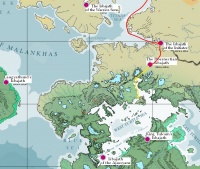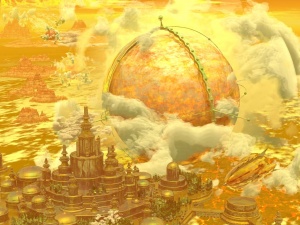Difference between revisions of "Main Page"
Trismegistus (talk | contribs) m (improve featured list) |
Trismegistus (talk | contribs) (changed featured article) |
||
| Line 39: | Line 39: | ||
| style="color:#000;" | <div id="mp-tfa" style="padding:2px 5px"> | | style="color:#000;" | <div id="mp-tfa" style="padding:2px 5px"> | ||
| − | [[File: | + | [[File:MapIsbajuthaDisradún.jpg|thumb|200px|Map of the Major Isbajutha in Disradún, Ptohlia, Shagrela'al, and Zephasia]] |
| − | + | Also known as the Psychic Crusades, the Isbajutha (plural, from [[Khahonri Language|Khahonri]] 'sebejeh,' to fight against with intention; singular isbajath), are the series of calculated wars that brought to an end the dominions of the great Chaos Rulers of the Middle Ages. The Isbajutha consist of the general psychic crusades demanded by the then-ruling [[Incarnandina]] and the lesser psychic crusades, each general Isbajath (psychic crusade) being designated with a number and each lesser isbajath designated with a non-numeric name. | |
| − | + | Numerous other conflicts arose during the Isbajutha as the worship of chaos and the practice of chaos magic had become firmly entrenched throughout the [[Pallathantic Region]]. The Shenimite Incarnandists, their converts, and their allies in the [[Arathracian Church]] followed an organized program aimed at eliminating the chaos leaders with immense success. | |
| + | |||
| + | The extirpation and exile of the most egregious leaders of the chaos movement fell even more swiftly on the Pallathantic than the speed with which chaos cults arose and flourished in the [[Middle Ages]]. Practitioners, priests, and cultist of chaos not slain or converted through the Isbajutha fled into hiding, sometimes with great irony, concealing themselves and their works in the very places of refuge where they had driven Incarnandists and others during the former rule of the princes of chaos. ([[Isbajutha|Full Article]]...) | ||
|- | |- | ||
Revision as of 10:08, 2 May 2014
|
|
|
|



